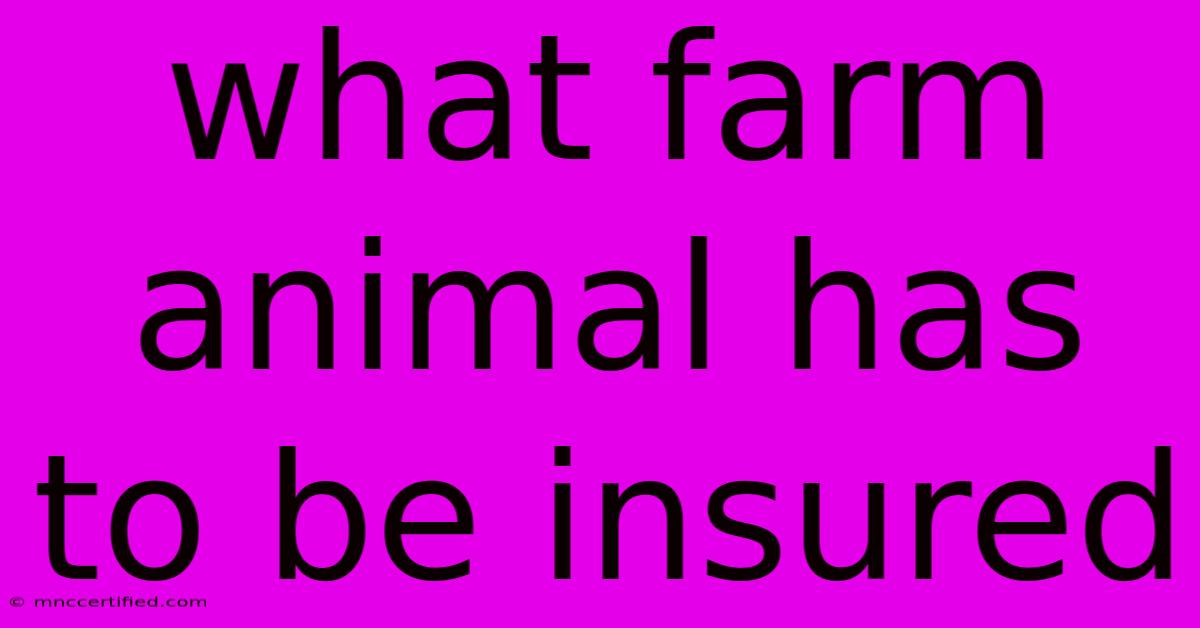What Farm Animal Has To Be Insured

Table of Contents
What Farm Animals Need Insurance? A Comprehensive Guide
Owning a farm comes with significant responsibilities, and one crucial aspect often overlooked is insurance. While insuring your buildings and equipment is standard practice, insuring your livestock is equally vital for protecting your financial investment and livelihood. But which farm animals need insurance, and why? This comprehensive guide will delve into the specifics.
Why Insure Your Farm Animals?
Before diving into which animals need insurance, let's explore why it's essential. Farm animals represent a substantial financial investment. Their loss due to illness, injury, theft, or even unforeseen events like natural disasters can cripple your farm's finances. Livestock insurance provides a crucial safety net, protecting you from devastating financial losses and allowing you to rebuild and continue operations.
Specific reasons to insure your farm animals include:
- Mortality: Death due to illness, accident, or disease.
- Theft: Protecting against the loss of animals due to theft or vandalism.
- Injury: Covering veterinary costs associated with injuries sustained by your animals.
- Natural Disasters: Protection against losses due to floods, fires, or other natural calamities.
- Disease Outbreaks: Compensation for losses caused by widespread disease outbreaks.
Which Farm Animals Require Insurance? The Key Factors
Determining which animals require insurance depends on several factors, including:
- Economic Value: High-value animals, such as prize-winning livestock or breeding stock, are often the priority. The higher the financial investment, the greater the need for insurance coverage.
- Type of Farming Operation: A dairy farm with a large herd will have different insurance needs than a small-scale poultry operation.
- Location: Geographic location impacts risk. Areas prone to natural disasters may necessitate broader coverage.
- Individual Animal Value: Individual animals with exceptional genetics or breeding potential might warrant individual insurance policies.
Common Farm Animals Commonly Insured:
While not every animal needs insurance, some are more frequently insured than others due to their economic importance. These include:
- Dairy Cattle: Dairy cows represent a substantial investment, and their loss significantly impacts milk production and income. Insurance protects against mortality, injury, and decreased milk yield due to illness.
- Beef Cattle: Similar to dairy cattle, beef cattle represent a significant investment, particularly breeding stock and high-quality animals.
- Horses: Horses, especially those used for racing, breeding, or showing, often have substantial value and require specific insurance policies. These policies often cover veterinary expenses, mortality, and liability.
- Pigs: Large-scale pig operations commonly insure their herds against mortality due to disease, accidents, or environmental factors.
- Sheep and Goats: The insurance needs of sheep and goats often depend on their breed and purpose (e.g., wool production, meat production, breeding).
- Poultry (Larger Operations): While smaller poultry operations may not find insurance cost-effective, larger commercial operations often insure their flocks due to high numbers and susceptibility to disease outbreaks.
Choosing the Right Livestock Insurance:
When selecting livestock insurance, consider these crucial factors:
- Coverage Options: Ensure the policy covers the relevant risks for your specific animals and farming operation.
- Policy Limits: Choose policy limits that adequately reflect the value of your livestock.
- Premium Costs: Compare premiums from different insurers to find the most affordable option that meets your needs.
- Claims Process: Understand the claims process and the insurer's reputation for timely and fair settlements.
Conclusion:
Insuring your farm animals is a crucial aspect of responsible farm management. While not all animals require insurance, those with high economic value or those involved in high-risk situations should be covered. By understanding the risks and choosing the right policy, you can protect your investment and secure the future of your farm. Consult with an insurance professional specializing in agricultural insurance to determine the most appropriate coverage for your specific circumstances. Remember, proactive risk management is key to a successful and sustainable farming operation.

Thank you for visiting our website wich cover about What Farm Animal Has To Be Insured. We hope the information provided has been useful to you. Feel free to contact us if you have any questions or need further assistance. See you next time and dont miss to bookmark.
Featured Posts
-
Utah Vs Colorado Final Score Game Highlights
Nov 17, 2024
-
Stream Tulane Vs Navy Football Game
Nov 17, 2024
-
Big Brother 2024 Winners Four Word Reply
Nov 17, 2024
-
Big Brother 2024 The Winner Is
Nov 17, 2024
-
Ufc 309 Tv Schedule And Livestream
Nov 17, 2024